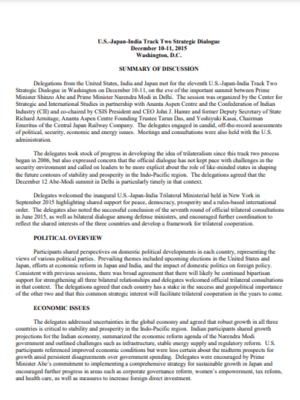Delegations from the United States, India and Japan met for the eleventh U.S.-Japan-India Track Two Strategic Dialogue in Washington on December 10-11, on the eve of the important summit between Prime Minister Shinzo Abe and Prime Minister Narendra Modi in Delhi. The session was organized by the Center for Strategic and International Studies in partnership with Ananta Aspen Centre and the Confederation of Indian Industry (CII) and co-chaired by CSIS President and CEO John J. Hamre and former Deputy Secretary of State Richard Armitage, Ananta Aspen Centre Founding Trustee Tarun Das, and Yoshiyuki Kasai, Chairman Emeritus of the Central Japan Railway Company. The delegates engaged in candid, off-the-record assessments of political, security, economic and energy issues. Meetings and consultations were also held with the U.S. administration. The delegates took stock of progress in developing the idea of trilateralism since this track two process began in 2006, but also expressed concern that the official dialogue has not kept pace with challenges in the security environment and called on leaders to be more explicit about the role of like-minded states in shaping the future contours of stability and prosperity in the Indo-Pacific region. The delegations agreed that the December 12 Abe-Modi summit in Delhi is particularly timely in that context. Delegates welcomed the inaugural U.S.-Japan-India Trilateral Ministerial held in New York in September 2015 highlighting shared support for peace, democracy, prosperity and a rules-based international order. The delegates also noted the successful conclusion of the seventh round of official trilateral consultations in June 2015, as well as bilateral dialogue among defense ministers, and encouraged further coordination to reflect the shared interests of the three countries and develop a framework for trilateral cooperation. The theme for this year’s dialogue was “Crafting New Korea–India Strategic Partnership amid COVID-19 Pandemic: Co-Navigation and Emerging Opportunities.” The dialogue was co-chaired by Dr. Naushad Forbes, Chairman, Forbes Marshall & Chairman, Ananta Aspen Centre, and Professor Choong Yong Ahn, Distinguished Professor, Chung-Ang University.
Latest
Insights
The Indo-Pacific Economic Framework for Prosperity: Key Opportunities & Concerns for India


- Podcast
Arohana An Ananta Podcast Series
News
Letter

Pramit Pal Chaudhury, Foreign Editor, Hindustan Times, and Distinguished Fellow & Head, Strategic Affairs, Ananta

Ambassador Sharat Sabharwal, Former High Commissioner of India to Pakistan and Distinguished Visiting Fellow, Ananta Centre

AFPAK DIGEST
Pramit Pal Chaudhury, Foreign Editor, Hindustan Times, and Distinguished Fellow & Head, Strategic Affairs, AnantaPramit Pal Chaudhury, Foreign Editor, Hindustan Times, and Distinguished Fellow & Head, Strategic Affairs, Ananta
Pramit Pal Chaudhury, Foreign Editor, Hindustan Times, and Distinguished Fellow & Head, Strategic Affairs, Ananta
Ambassador Ashok Sajjanhar, Former Ambassador of India to Kazakhstan, Sweden and Latvia; President, Institute of
Ambassador Ashok Sajjanhar, Former Ambassador of India to Kazakhstan, Sweden and Latvia; President, Institute of
India Should Aim To Be A ‘Super Partner’
All of this makes India, potentially, a ‘super partner’ rather than a ‘super power’. A...
Reports
AFRICA DIGEST
Pramit Pal Chaudhury, Foreign Editor, Hindustan Times, and Distinguished Fellow & Head, Strategic Affairs, Ananta






















